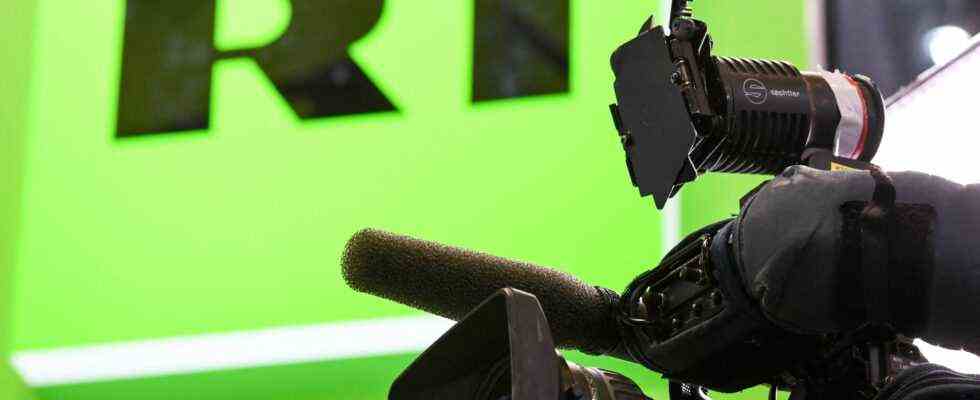fact finder
As of: 09/28/2021 9:07 p.m.
YouTube has deleted the channels of the Russian state broadcaster RT DE. The reason is apparently disinformation about Covid-19. The RT editor-in-chief hopes that German media in Russia could now be closed.
The YouTube channels of the Russian state broadcaster RT Deutsch are no longer available. According to RT DE, they were deleted because of violations of the guidelines for false medical information of the video platform. An archived version of RT DE’s YouTube homepage shows that the state broadcaster had around 600,000 subscribers there at the end of August. The deletion is also a hard blow for the Russian state broadcaster, as RT DE has included its own video contributions via YouTube on its own website.
RT editor-in-chief Margarita Simonjan wrote on Twitter of a “media war” between the German state and Russia. She hoped that German media could now be banned in Russia or their offices could be closed. What the state or the German media should have to do with YouTube’s decision remained unclear.
“Information war”
Editor-in-chief Simonjan already had an interview in 2012 with explained to the Russian newspaper Kommersant, one is in an information war. While the Russian Defense Ministry was fighting in Georgia, she and her colleagues were waging an “information war” against the entire western world.
The office manager of RT DE, Dinara Toktosunova, recently spoke of an “information war” in an interview with the broadcaster Arte TV: “I actually think that the whole world is at a war over information. If you wonder where the third party is World war is – that is in the information area. “
In German, RT has so far distributed content in other social media and on its own website, apart from YouTube. In December, the German subsidiary RT DE Productions GmbH wants to start a television channel “RT in German”. A studio was set up in Berlin-Adlershof for daily news broadcasts, talk shows and other formats and more than 200 jobs were advertised. But an application for a broadcasting license in Luxembourg failed. According to the responsible media authority in Berlin-Brandenburg, the broadcaster did not submit an application in Germany.
In March, a spokeswoman for the Russian Foreign Ministry complained to the German government that the German Commerzbank wanted to close the accounts of RT DE Productions GmbH and “Ruptly” by May 31. The spokesman for the Foreign Office in Berlin, Christofer Burger, made it clear that “the Federal Government has in no way worked to end the business relationship with Commerzbank”.
Lawsuits against critics
RT is sometimes aggressive against critics of Russian propaganda in Europe. Libel lawsuits have been brought in France.
The sued political scientist Nicolas Tenzer wrote in an article for “Le Monde” that a state was trying to instrumentalize the judiciary on a large scale. He recalled that the European Parliament and the Council of Europe had already warned against “Strategic Public Lawsuits” (SLAPPs). EU Commissioner Vera Jourova is working on a guideline to protect journalists from such lawsuits.
Crude theses
During the pandemic, RT DE carried some crude theses about the corona pandemic. Isn’t there a “second wave” at all? The Russian state broadcaster asked on its website at the beginning of December, for example. Such content from RT DE is very often shared in milieus of corona deniers and “lateral thinkers”, as analyzes of data have shown.
RT DE and the Rügen
The media reported several times about misleading content on the Russian portal. On a SWR request RT DE announced that they are “not doing campaign journalism, but staying on the ground with the facts and presenting a wide range of perspectives”. And further: “We are not aware of a single case in which the Press Council has publicly reprimanded RT DE.”
What RT DE did not mention: The press council cannot reprimand the state medium because it has never applied for control by the body.
While the Russian state broadcasters abroad are apparently specifically trying to sow doubts about vaccinations – for example, there was talk of an alleged “vaccination massacre” in Norway, the Russian vaccine Sputnik V is presented as safe.
In the 2019 report on the protection of the constitution, the Federal Office for the Protection of the Constitution RT Deutsch and the Sputnik news agency ascribe particular importance to the goal of the Russian leadership to “influence political and public opinion in Germany in the interests of Russian politics”. The RT subsidiaries red-fish and “Ruptly” are seen as part of an associated complex network.

